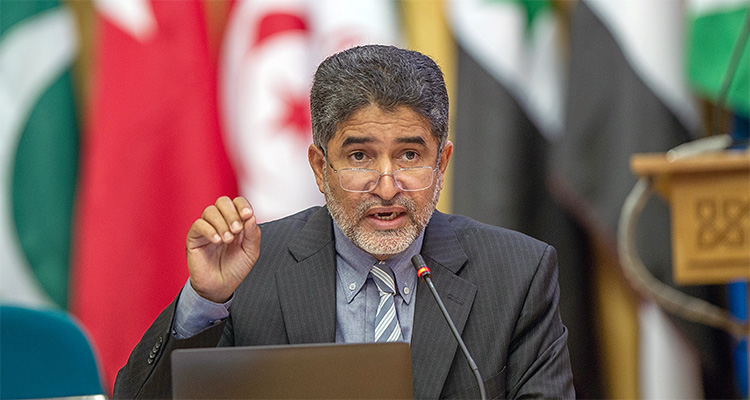
18 October 2021 - We have just concluded the 68th session of the Regional Committee for the Eastern Mediterranean, which was held remotely from 11 to 14 October 2021.
This session was held under the theme “Rebuilding better and fairer: stronger systems, resilient communities”. It is a profound slogan that summarizes the goals that we aspire to achieve in the Region, and we are working diligently with Member States to make those goals a reality.
For four days, the meetings of the Regional Committee involved intense discussions, deliberations, exchange of views and experiences with the participation of their Excellencies ministers of health, representatives of Member States, partner organizations and WHO experts. We reviewed the health situation in the Region with the COVID-19 pandemic and its impact at all levels and stressed the urgent need to develop strong and resilient health systems, supported by stronger economic, social and security systems.
We also discussed priority health issues and health emergencies that impact many countries in our Region. The Eastern Mediterranean Region has the largest number of refugees, migrants and forcibly displaced persons in the world. Conflicts have driven more than 32 million people from their homes, representing more than 40% of all forcibly displaced persons worldwide. Wild poliovirus, which no longer exists anywhere else in the world, continues to infect and disable our children.
These extensive discussions have resulted in several resolutions aimed at translating words into concrete policies and action on the ground.
I am pleased that the Regional Committee formally adopted the comprehensive report on WHO’s work in the Region and expressed its appreciation for the support provided by WHO in responding to the COVID-19 pandemic, and also committed to implementing a Midterm Push Forward Plan to accelerate implementation of our vision for the Region, Vision 2023. The resolution includes a package of measures, including support for the establishment of a high-level ministerial team to combat tobacco, emerging tobacco and nicotine products in the Eastern Mediterranean Region.
The Regional Committee was gravely concerned about the continuing public health risks posed by the COVID-19 pandemic and its social and economic impacts, and the resulting obstacles to achieving the Sustainable Development Goals (SDGs). Issues include alarming new variants, gross inequity in the distribution of vaccines between and within countries, and inconsistent implementation of and compliance with public health and social measures, as well as multiple other ongoing and recurring emergencies in the Region.
In a resolution on accelerating emergency preparedness and response efforts in the Region, the Committee emphasizes that the prevention of, preparedness for, detection of, response to and recovery from health emergencies are primarily the responsibility and function of governments, while also acknowledging the key leadership role of WHO within the United Nations system in preparing and coordinating a comprehensive response to health emergencies. Governments should work with all relevant sectors to prioritize responding to the COVID-19 pandemic, increasing the availability of COVID-19 vaccines, vaccinating at least 40% of the population by the end of 2021 and 70% by mid-2022 as per WHO goals, reducing inequalities in access to vaccines through financial contribution to the COVAX facility and vaccine donation from high-income countries, and promoting the implementation of and adherence to preventive measures.
In the same resolution, the Regional Committee calls on Member States to strengthen the resilience of health systems by integrating preparedness for health emergencies into the overall strengthening of health systems and establishing sustainable financing for health emergency preparedness and response as a clear government priority in the national budget.
The COVID-19 pandemic has revealed serious gaps and weaknesses in the capacities of countries as regards disease surveillance, and so the Regional Committee agreed a resolution adopting a new regional strategy for integrated disease surveillance which will help to overcome data fragmentation in the Region. Member States are urged to commit to achieving integrated and effective national surveillance systems linked to global surveillance systems by the end of 2025, and to develop the necessary mechanisms and allocate the necessary human and financial resources in a sustainable manner to achieve that goal.
Reflecting its belief that communities and civil society organizations can play a valuable role in identifying health issues, assessing needs, ensuring effective resource allocation, and participating in health programmes and interventions for development, emergency prevention, preparedness and response, the Regional Committee issued a resolution adopting a roadmap on building resilient communities to improve health and wellness in the Eastern Mediterranean Region. The roadmap will guide Member States in establishing clear governance structures and mechanisms that allow community and civil society representatives to effectively contribute to public health policies, plans and programmes, implementing community initiatives through which communities can be involved, and promoting health education and capacity-building for frontline health workers, whether professionals or community volunteers.
The Regional Committee issued a further resolution adopting a regional framework for action on diabetes prevention and control, noting with concern that diabetes is now more prevalent in the Eastern Mediterranean Region than any other WHO region. Member States are urged to prioritize the prevention and management of diabetes and its risk factors by developing and/or strengthening policies and programmes through a multisectoral action plan, setting time-bound national targets and indicators for the prevention and control of diabetes, allocating sufficient financial resources to implement these policies and programmes, and including diabetes in universal health coverage benefit packages.
The resolution requests the Regional Director to assist Member States in implementing the regional framework for the prevention and control of diabetes and to facilitate the establishment of regional networks for the exchange of information, good practices and lessons among Member States and the strengthening of partnerships and cooperation in this field.
These five resolutions represent a new starting point for our work in the years to come and we will strive for their optimal implementation to achieve the desired results, rebuilding better, stronger, more resilient and more equitable systems and societies.




